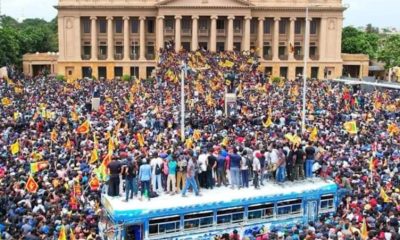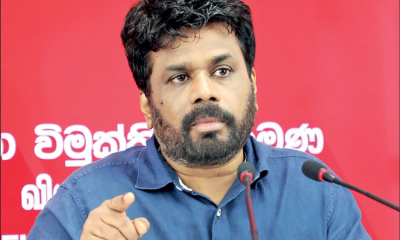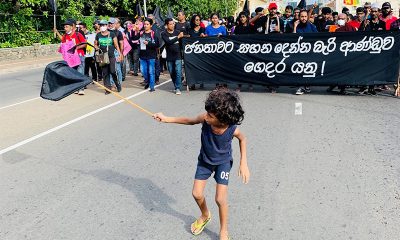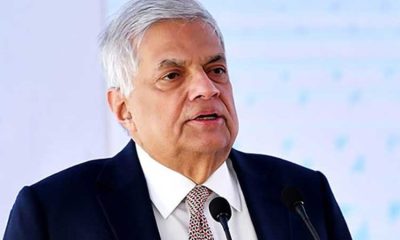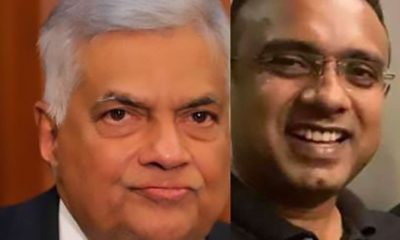Editorial
Singapore-style pursuit of corruption? Forget it

We Lankans are famous (or should we say notorious?) for frequently talking like the proverbial fisherman boasting about “the one that got away.” In our case we are fond of recalling where Singapore was in terms of development and where we were when the sun finally set over the British empire. The older among us still remember Singapore’s ‘Miracle Man’ Lee Kwan Yew going on the public record during a visit to our newly independent island after Singapore herself had cease to be a British colony that he would like to emulate us in his island state.
No doubt we were then a country worth emulating. Our population was manageable and we were relatively resource rich with a largely British-owned plantation sector dominating our exports. Colombo was a garden city, as it was frequently described once-upon-a-time. English was our language of administration and the white collar segment of our population, both in the public and private sectors, was fluent in that language. We were strategically located on the southern tip of India with this island blessed by two monsoons and with an enviable climate. We were without doubt a very nice place to live in and could have attracted more foreign investment than we did post-Independence if we did not have a strong left movement which was possibly a deterrent to such investment. But it certainly enabled welfare benefits though not only for the poorer sections of community.
There is no need to labour where Singapore is today and where we are now, a declared bankrupt state though our leaders keep dangling a rosy picture of light at the end of the tunnel. Recent events in Singapore, where its Transport Minister S. Isvaran was sent on leave by Prime Ministe Lee Hsien Loong after the city state’s anti-graft agency began a probe against him, the first in almost 40 years when such an investigation had begun against a cabinet minister. He was since arrested and bailed and Lee, saying that there was no precedent to go on, has ordered the slashing of his salary to a fraction of what it was. This was on the basis of how a senior civil servant would be dealt with in the event of such an investigation.
Contrast that to what prevails here. We have a cabinet minister in the government convicted by a the Colombo High Court and sentenced to a term of two years rigorous imprisonment, suspended for five years. He has also been imposed a fine of Rs. 25 million and ordered to pay a businessman who he is alleged to have threatened a sum of one million rupees compensation. This case related to a matter of clearing a land in the Meetotamulla area of Kolonnawa of unauthorized occupants. The Minister concerned, Mr. Prasanna Ranatunga, continues to occupy a frontbench seat in parliament and also serves as chief government whip while the conviction is under appeal. But in India Congress leader Rahul Gandhi lost his seat in the Lok Sabha following a defamation conviction. That matter too is under appeal and Gandhi remains outside parliament.
That is not all. There is another cabinet minister who was accused to soliciting bribe from a Japanese company during the Gotabaya Rajapaksa presidency. The allegation widely circulated on social media and mentioned in parliament saw Rajapaksa requesting the minister concerned to temporarily resign. This he did and he was thereafter cleared by an investigation by an official committee. This, of course, was not done in public and the people remain blissfully unaware of the proceedings. The minister has since returned to office. It’s now back to business as usual and despite the various promises made both to the country and also to the International Monetary Fund about tackling corruption no favourable movement in this direction is visible.
The system change demanded by the aragalaya has still not happened although President Gotabaya Rajapaksa and Prime Minister Mahinda Rajapaksa are now out of office living in taxpayer supported luxury. Many elected representatives of the people who took a heavy blow when their homes and property were attacked at the height of the disturbances and disappeared from sight have now crawled out of the woodwork and are very much seen and heard. There is little doubt that these attacks, soon after Prime Minister Ranil Wickremesinghe’s private home was torched, were carefully planned and executed but there has been no clear breakthrough on who was responsible. The IGP has made out that police lethargy was due to MPs themselves interfering in OIC appointments implying that unsuitable policemen were in charge. This is an obvious attempt to wash his hands off an abject law enforcement failure.
Most of the political victims of what happened in July 2022 are looking for compensation from the state. The public will clearly oppose any such payment. In their book politicians have made enough. There is little discussion on the subject but various deals are possible as an election year approaches. The president is looking for a term where he’s elected by the people rather than parliament while the SLPP is divided on whether they will go along with the man they elected last year or paddle their canoe with their own candidate. All kinds of deals are possible in the coming months but what is assured is there will be no Singapore-style pursuit of wrongdoers. What Lee Kuan Yew thought of this country he has visited many times under different leaders is clearly set out in his book ‘From the Third World to the First’. It makes good reading.
Editorial
Hoarders run riot; govt. all at sea

Tuesday 3rd March, 2026
Sri Lankans had to languish in long queues outside filling stations for days on end in 2022, when the country was short of foreign exchange for fuel imports. The JVP/NPP leaders made the most of that situation; they condemned the government of the day, instigated protests and shored up their electoral prospects. Today, winding queues have appeared again outside filling stations due to panic buying and hoarding triggered by the ongoing Middle East conflict though the Ceylon Petroleum Corporation (CPC) has assured that it has fuel stocks sufficient for more than four weeks. The government is apparently all at sea, unable to stop panic buying and hoarding. Curiously, it has baulked at adopting the QR-based fuel dispensing method to keep panic buyers and hoarders at bay.
CPC Chairman D. J. Rajakaruna yesterday claimed that the QR-based fuel issuance method had been introduced during a fuel crisis, and therefore there was no need for it to be reintroduced as the country had enough fuel stocks. His argument is flawed. That method needs to be introduced as a temporary measure to clear the queues and prevent panic buying and hoarding from causing a countrywide fuel shortage. The government seems to be labouring under the misconception that it will be able to get rid of queues by stepping up the fuel supply. This measure is ill-conceived, for it will lead to more hoarding, with queues persisting. Most of all, it is not possible to replenish fuel stocks at all filling stations countrywide daily to meet the increasing demand, and even if the CPC accomplished that task by any chance, queues would still not go away; tuk-tuk operators are in overdrive stocking up on fuel. Trishaws never leave fuel queues; they rejoin queues after obtaining fuel and pumping it into cans. They are not alone in doing so. If police care to conduct raids, they will be able to detect hoarded fuel in many houses.
What the persistence of fuel queues signifies is that the public does not take the government’s assurances seriously; there seems to be a serious trust deficit. Worse, those who have listened to the government and refrained from joining fuel queues find themselves at a disadvantage; with panic buyers and hoarders waiting in queues and buying all the fuel. At this rate, they, too, will be compelled to join the queues, cursing the government.
The government seems to think that panic buying and hoarding of fuel will help boost its revenue substantially as petroleum products are heavily taxed, but it ought to look at the bigger picture and take urgent action to prevent the depletion of its fuel stocks if it is to avert a crisis. The current conflict in the Middle East is bound to take a heavy toll on remittances from expatriate workers, export proceeds and tourism earnings at least in the short term, thereby causing a severe strain on the country’s foreign currency reserves. There is a pressing need to control the forex outflow, but hoarding of fuel will create a situation where the government will have to spend more foreign exchange on oil imports. If fuel stocks are depleted—perish the thought—it will take months to replenish them, and emergency purchases will have to be made at a premium. Such an eventuality will entail huge economic and political costs.
Has the NPP government stopped short of adopting the QR-based fuel dispensing method lest the credit for tackling panic buying and hoarding should go to the previous rulers who introduced it to manage a far worse fuel crisis? It will be a big mistake for the government not to curtail the huge increase that panic buying and hoarding have led to in the demand for fuel.
If panic buying and hoarding of fuel do not show signs of abating today, the government ought to swallow its pride and adopt the QR-based fuel issuance method. Nobody will think less of it for doing so; however, it will incur public wrath if it fails to ensure that fuel is readily available countrywide.
Editorial
A world order defined by sheer madness

Monday 2nd March, 2026
We are witnessing a new world order that is anything but rules-based. The US has once again demonstrated that might is right. Big powers have placed themselves above international law and reduced the UN to a mere spectator.
US President Donald Trump has graduated from abductions to assassinations in dealing for foreign leaders he considers hostile. The US and Israel seem to think they have succeeded in engineering a regime collapse in Iran by assassinating Supreme Iranian Leader Ayatollah Ali Khamenei and scores of others in a series of air strikes on Saturday. Those killings must be condemned unreservedly. President Trump has audaciously claimed in a social media post that a wicked man was eliminated. The question is whether those who ordered Saturday’s air strikes, killing many Iranian civilians, including schoolgirls, can consider themselves any less wicked.
If history is anything to go by, air strikes alone cannot bring down long-established systems, and there is no guarantee that the toppling of a repressive regime always yields positive results and helps bring order out of chaos. Iraq and Libya may serve as examples. They remain fragmented and are in a far worse situation than they were under Saddam Hussain and Muammar Gadhafi respectively. The US and its allies plunged those two countries into anarchy in the name of eliminating repressive regimes.
The US and Israel are accused of waging a diversionary war for the benefit of President Trump and Israeli Prime Minister Benjamin Netanyahu. Both of them are facing scandals at home. Trump is troubled by a renewed scrutiny of the Epstein files and a Supreme Court judgment preventing him from imposing tariffs according to his whims and fancies. Netanyahu is facing bribery and fraud charges, and will be in serious trouble if voted out of power. He has to cling on to power at any cost. Fighting wars purportedly to save Israel seems to be the only way he thinks he can keep his political enemies at bay at home.
Iran has threatened to destroy Israel and the US, but its military capabilities are limited, as is known to military experts. It would never have taken on the US militarily or done anything fraught with the danger of triggering disproportionate military retaliation. It has been nowhere near developing nuclear weapons. The casus belli that Trump and Netanyahu used to attack Iran reminds us of the falsified intelligence dossiers President George W. Bush and British Prime Minister Tony Blair unashamedly produced in a bid to justify the invasion of Iraq. They said Saddam Hussain had stockpiled weapons of mass destruction, but they could not trace any.
The current Iranian regime, whose crackdown on protesters claimed thousands of lives, has weakened international opposition to US aggression significantly. However, some prominent Democrats have already condemned Trump’s bombing spree. U.S. Senator Tammy Baldwin has pointed out that Trump’s military action is illegal in that according to the US Constitution, if the President wants to start a war, the Congress, elected by the people, needs to sign off on it. He has said the Senate needs to come back immediately to vote on Trump’s senseless and illegal bombings. The Republicans have defended Trump’s military aggression, claiming that it is in the interests of the Iranian people.
One can only hope that the US Congress and judiciary will make Trump act with restraint.
****
Adopt QR remedy
The escalation of the Middle East conflict has triggered panic buying of fuel in Sri Lanka. Long lines of vehicles could be seen near fuel stations in various parts of the country at the time of going to press. The Ceylon Petroleum Corporation (CPC) had to step up fuel supply yesterday while claiming to have fuel stocks sufficient for more than one month and urging the public not to panic. The raging conflict is bound to affect the global fuel supply, and this is why Sri Lankans have panicked.
There is no reason to doubt the veracity of the CPC’s claim that it has sufficient fuel stocks, but panic buyers are impervious to reason. Unless hoarders are kept at bay, the CPC will run out of its stocks soon. One may recall that during the 2022 economic crisis, pumps ran dry at most filling stations mainly due to excessive hoarding. Rationing helped bring the situation under control.
The only way to stem the current wave of panic buying of fuel is to activate the QR-based fuel issuance system. Unless the government adopts that method forthwith and arrests panic buying, hoarders will have a field day and create a fuel shortage.
Editorial
Caught, released and caught again

Arumahandi Janith Madushanka de Silva alias Podi Lassi, a dangerous underworld character, who was arrested in India, was brought back to Sri Lanka yesterday. On watching his arrival at the BIA, Citizen Perera must have uttered the same words as Mr. Bumble in Oliver Twist: “The law is an ass”. Criminals are caught, released and caught again. Arresting an underworld figure is no walk in the park. It takes months of meticulous planning to nab powerful criminals protected by private armies. The crime busters who risk life and limb to track down criminals are demoralised when the suspects they arrest get bail and flee the country.
Podi Lasi was arrested in 2020 and detained in the Boossa high-security prison, together with some other dangerous criminals. He secured bail in 2024. It was obvious that he would flee the country. He played the victim card, claiming that the STF was planning to kill him. His lawyers even demanded that he be given protection. He disappeared soon afterwards, and no one was surprised.
Many an eyebrow was raised when Podi Lassi was enlarged on bail, for he had even issued death threats to the then President and the Defence Secretary. In 2020, while in detention, Podi Lasi and two other underworld characters known as Kosgoda Tharaka and Pitigala Keuma threatened to harm the then President Gotabaya Rajapaksa, Defence Secretary General Kamal Gunaratne, and some senior prison officers. Podi Lassi bragged that his hit squads were capable of taking any target. Those who are charged with less serious offences than drug smuggling and underworld activities are denied bail in this country to prevent them from intimidating witnesses and fleeing overseas.
One may recall that a notorious drug dealer named Mohommad Najim Mohommad Imran alias Kanjipani Imran obtained bail in 2022. Everybody knew that he would flee the country, and he did so a couple of weeks later. The then Public Security Minister Tiran Alles claimed that some unscrupulous lawyers had facilitated Imran’s escape and that of another criminal called Ganemulle Sanjeewa. Imran had been arrested in Dubai together with Sri Lanka’s Napoleon of Crime, Samarasinghe Arachchige Madush Lakshitha alias Makandure Madush in 2019, and brought back to Colombo. Madush perished allegedly in a crossfire between the police and an underworld gang while in custody. Imran has been running his crime syndicate here from overseas. He is believed to have masterminded the murder of Wasantha Perera or Club Wasantha in 2024. Ganemulle Sanjeewa was gunned down inside a courtroom in Colombo in 2025.
Some underworld kingpins have turned this country into a narcotic hub, for all intents and purposes, if the sheer amounts of dangerous drugs frequently taken into custody are any indication. They are capable of killing anyone anywhere. A lawyer and his wife were gunned down near the defence headquarters complex, Akuregoda, recently.
It is public knowledge that whenever a drug czar is netted, a well-coordinated operation gets underway to secure his release, with lawyers, politicians, and some rogue elements in the police and other state institutions such as the Government Analyst’s Department springing into action. In September 2023, Nadun Chinthaka Wickremaratne alias Harak Kata almost escaped from the CID headquarters where he was detained and interrogated. If not for some vigilant STF personnel, his crime syndicate would have been able to launch a spectacular operation with the help of some commandos and spring him free. Salindu Malshitha alias Kudu Salindu, arrested with Harak Kata in Madagascar, and extradited to Sri Lanka in 2023 also fled the country after obtaining bail.
Sri Lanka’s anti-narcotic laws are characterised by glaring inadequacies that allow clever lawyers appearing for wealthy drug lords to drive a coach and horses through them. They have done so on numerous occasions much to the dismay of the police and the public. The need for laws with stronger teeth to deal with drug lords and other such criminals firmly and make this country safe for the ordinary citizens cannot be overemphasised.
-

 Opinion5 days ago
Opinion5 days agoJamming and re-setting the world: What is the role of Donald Trump?
-

 Features5 days ago
Features5 days agoAn innocent bystander or a passive onlooker?
-

 Features2 days ago
Features2 days agoBrilliant Navy officer no more
-

 Features6 days ago
Features6 days agoRatmalana Airport: The Truth, The Whole Truth, And Nothing But The Truth
-

 Business7 days ago
Business7 days agoDialog partners with Xiaomi to introduce Redmi Note 15 5G Series in Sri Lanka
-

 Features7 days ago
Features7 days agoBuilding on Sand: The Indian market trap
-

 Opinion7 days ago
Opinion7 days agoFuture must be won
-

 Opinion2 days ago
Opinion2 days agoSri Lanka – world’s worst facilities for cricket fans


